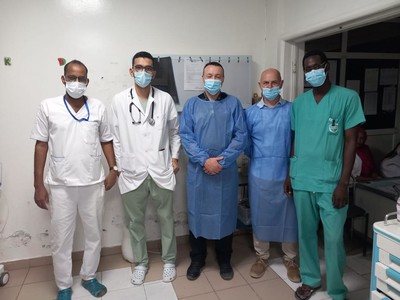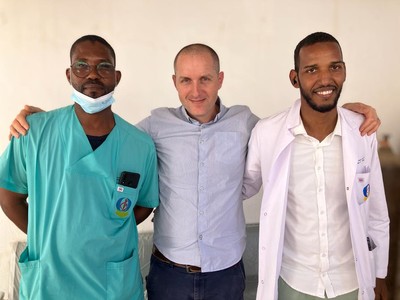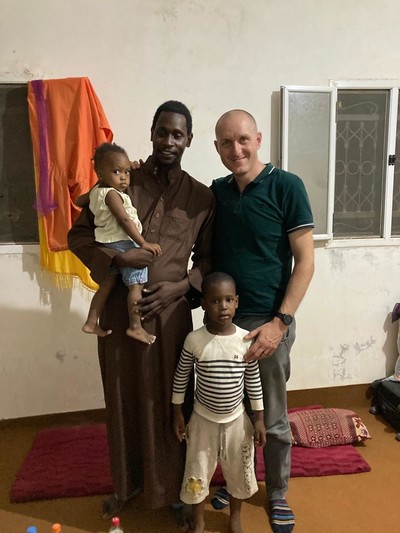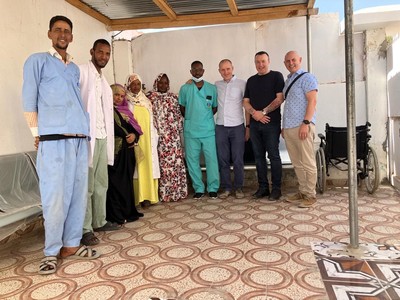
Blog: Greetings from Mauritania: Dr Dave Fearon
![]() Cairdeas
Cairdeas
![]() 18th January 2024
18th January 2024
Many thanks to the blog author, Dr Dave Fearon, for his update from Mauritania; an arm of "Cairdeas Sahara."
Mauritania is positioned as a bridge between North and West Africa, bordered by the Sahara Desert on the east and the Atlantic Ocean on the west. It is a very large country but much of it is desert and one million, a quarter of the population, live in the coastal capital, Nouakchott. Mauritania is a lower middle-income country with much poverty visible throughout the country. Much of its healthcare provision lacks resources, both physical and personnel. Access to the available services is inequitable, with the majority of structures centralised in the capital, Nouakchott. National cancer services are only provided at the Centre National d’Oncologie (CNO) in Nouakchott, where chemotherapy, hormone therapy and radiotherapy are available to those who have managed to have their cancer diagnosed and have been referred.
Cairdeas International Palliative Care Trust has been involved in the country since 2012 when I moved there with my young family. I was involved in providing palliative care, training, advocacy and research between 2012 and 2019, after which we moved to Isle of Lewis. In Mauritania, I led a small team of nurses providing home based palliative care under the authority of a local charity. We worked closely with the CNO. We trained many of their staff including sponsoring several employees’ training at Hospice Africa Uganda and attendance at international conferences. During my stay we benefitted from a range of international visitors who came to help, especially with training. Key visitors were Dr Mhoira Leng, Dr Jaques-Antoine Pfister, Dr Silvia Dive, Dr Nahla Gafer and Dr Mohja Marhoom. The latter four visited twice, with Drs Nahla and Mohja visiting in 2023, returning home only days before the start of their home country of Sudan’s troubles.
I had the privilege of visiting for ten days in November 2023. I had very few expectations as I knew that the local charity had no plans or capacity to continue the palliative care after my leaving. I took two friends from Scotland with me, an Anaesthetist friend and financial supporter of the project, and a church of Scotland pastor from the Isle of Lewis. We had a blast and were greatly encouraged by the visible changes since 2019, all of which have been locally led and funded.
Dr Benina became the director of the CNO in 2018. From knowing her work in the paediatric oncology prior to her appointment I knew she was a special person, knowledgeable and compassion. She is very much the driving force of palliative care in Mauritania. The following points are some of the highlights from our trip:
1. New palliative care unit around 500 metres from the CNO, funded and staffed by CNO staff. Led by the lovely Dr Mohamed Elyatt, a medical doctor, and supported by the amazing nurse Aisha, both of whom Cairdeas sponsored to train in Uganda. They offer day hospice, wound dressings, out patients, social work assistance and home visits.
2. Home visits – we participated on several home visits, seeing the range of cases and social settings.
3. Spending time with two Palestinians who are known to Cairdeas from the work in Gaza. Dr Nahla arranged for them to work at the CNO after they became trapped outside of Palestine. Humbling to spend time with them on the home visits and see their passion and compassion for patients while under such pressure, fear and uncertainty about their own families. One had not received any word from his wife for several days while we were there.
4. The CNO continues to advance cancer care for Mauritania. They are more involved in training, research and they are making efforts at trying to make palliative care more integrated with cancer care.
5. We caught up with Ndiaye who was my best friend, and the local palliative care champion while I was living there. He is a very special, intelligent, kind and a very capable person. It was encouraging that his attributes have been recognised by the ministry of health, and he is now highly valued (and very well paid) by the Mother and Child Hospital. Although he is not involved in palliative care day by day, he remains a passionate advocate for it, and he is still young with a young family. I am pleased he has a job which allows him to care for his family. I hope the ministry facilitates his return to palliative care in the future.
6. We visited the ICU department at the mother and child and able to chat with the doctors about palliative care.
7. Another encouragement was the reminder that people are the same everywhere, whatever their nationality or faith. We were able to reflect on the similarities of beliefs and actions of Christians on the Isle of Lewis and Muslims in Mauritania, with their shared fears, worries and hopes.
8. Mahloud, an orderly at the CNO has been involved in palliative care for over 15 years. He started cleaning the cancer wounds and ulcers at the CNO because the nurses at that time refused to do the job because of the smell and the horrors. He has continued to care for his patients and is now an integral part of the palliative care team. During our visit he was told by the director that they are paying for him to do some preliminary nursing studies in neighbouring Senegal, which will mean more knowledge, respect and pay. Definitely my biggest smile of the trip, so well deserved.
9. I am confident in the foundation of palliative care in Nouakchott because it is funded and staffed exclusively by Mauritanians. There is still a long, long way to go, but these are undeniable positives signs of something sustainable, culturally relevant and feasible being built.

All photos are from Dr Dave Fearon; palliative care provision in Mauritania.

Masked medical team with Dr Dave Fearon (second from right).

Mahloud, Dave, and Mohammed Elyatt pose for a photo.

Pleased to see colleague Ndiaye and his family again.

The multi-disciplinary palliative care team!
